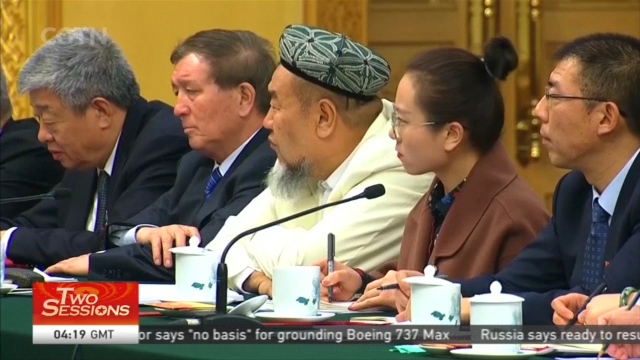
13:47, 13-Mar-2019
China's Annual Political Season: Anti-terrorism addressed at Xinjiang delegation press briefing
Updated
13:40, 16-Mar-2019
01:54

Leaders from China's Xinjiang Uygur Autonomous Region have strongly defended their anti-terrorism policies. Officials with the Xinjiang delegation at the NPC rejected charges that Uygur Muslims have been forced into what critics call detention centres. CGTN's Nathan King was at the Press briefing.
A packed briefing Tuesday afternoon in Beijing. Xinjiang officials first focused on the rapid development of the region, it's central position along China's Belt and Road Initiative and the huge influx of tourists, now 150 million a year.
SHOHRAT ZAKIR CHAIRMAN, XINJIANG UYGUR AUTONOMOUS REGION "Since the 18th national Party congress the region's gross domestic product has grown at an average annual rate of 8.5%. The characteristics of high quality development are increasingly evident."
NATHAN KING BEIJING "Aside from development and tourism it was really terrorism that dominated the question and answer session and the most robust defense yet that we've seen from authorities."
SHOHRAT ZAKIR CHAIRMAN, XINJIANG UYGUR AUTONOMOUS REGION "We have established vocational skill training centers geared toward counter-terrorism and stability. When individual foreign media outlets talk about concentration camps, these statements are purely fabricated and highly ridiculous."
Xinjiang officials say their programs fighting terrorism are making an impact - they reported zero terroritst attacks in the region for more than two years straight. They also said the programs could be phased out but the international terrorism situation remained bad. While some people in the West have criticized Xinjiang's policies, the Organization of Islamic Cooperation - which represents 57 mainly Muslim majority states with a population of 1.8 billion people - just last week passed a resolution backing Xinjiang's efforts.
Nathan King, CGTN, Beijing.

SITEMAP
Copyright © 2018 CGTN. Beijing ICP prepared NO.16065310-3
Copyright © 2018 CGTN. Beijing ICP prepared NO.16065310-3